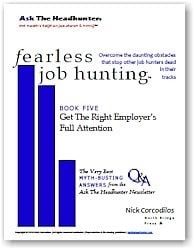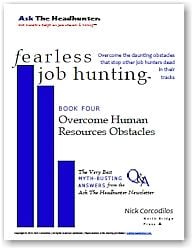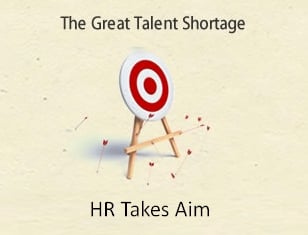In the May 27, 2014 Ask The Headhunter Newsletter, a manager explains how she hires by respecting job applicants:
I’m a longtime reader. Your advice has helped me in my job searches and salary negotiations. I recently landed a great job with a great salary, where I have done very well. Well enough, in fact, that I’m now the one in charge of my team, and we are hiring! So now I’m on the other side of the job-search equation.
Since I take your advice to heart, as I conduct my candidate search I am:
Not relying on job boards. I am pursuing local networking opportunities.
- Treating my applicants with courtesy by replying promptly and keeping them updated.
- Communicating clearly about our interviewing procedures.
- Trying to be respectful of my applicants’ time, and not requiring multi-day interview processes.
The one place where I’m a little stuck is about salary history. As an applicant, I would never give away my current or past salary. When pressed about my expectations, I hedge with statements like, “I hope to be paid a market salary commensurate with my skills.”
But as a hiring manager working with a limited budget, it seems it’s my responsibility to play hardball and try to get the best candidate within our price range.
Do you consider it unethical to press for salary history? Is there any happy medium? Is there any way I can determine quickly if someone is out of my range, without asking them to compromise themselves? Do you have any advice for a well-intentioned member of “the other side?”
Best regards,
Annie
Nick’s Reply
Your four bulleted hiring techniques speak for themselves. Unfortunately, too many managers and companies fail to follow your simple rules. That means you have less competition — good applicants will recognize a good manager.
I’m glad to hear my salary strategy (Keep Your Salary Under Wraps) has been helpful to you as a job hunter. I think it can be just as helpful now that you’re hiring. Please consider approaching this the same way.
If you have a budget for a job, what’s wrong with stating a compensation range to your serious candidates? (That is, the ones you’re going to interview.) It’s easy enough to say, “Just to be clear, our comp range is $X to $Y, and if we’re going to go to $Y, you’d have to demonstrate how you’re going to contribute to our profitability to justify it.”
You don’t need to announce this in advance, but I’d make a phone call to each of your best candidates when you have identified them. I think they will appreciate it. “I’m disclosing this to you because I don’t want you to interview unless you’d be happy with an offer in that range. I like to be above board.”
As long as you stay within your budget, I don’t think you’ll have a problem. You have a clear obligation to your company to stay within budget – and I think this accomplishes that.
“Hardball” is actually just honest ball. I don’t think you’re going to lose a great candidate by being honest. Anyone outside your range is, well, outside your range. And if someone outside your range is honestly willing to interview for less than they’re making or have been making, that’s up to them.
Make sense? Of course, knowing someone’s salary history doesn’t help you decide what to offer them. What other employers paid is their judgment, within their business. Value is relative, and you must make your own judgment for your own business. It seems to me you’re already okay with this, and that gives you an edge over your competitors.
I think it’s always best for employer and applicant to agree on the general salary range they’re both comfortable with before they start talking seriously. The best way to ensure this is for the employer to state the range of salary for the job. This does not mean you must let yourself be swayed to the high end if you don’t think the candidate is worth that much — which is why I suggest making that clear from the outset. (Job applicants can make their case by following the methods in Fearless Job Hunting, Book 9: Be The Master of Job Offers.) Of course, you should phrase this in a way that’s right for you — my words are mine, not yours!
My highest compliments for demonstrating such high standards in your hiring practices. You’re a manager who respects job applicants. I wish more managers would follow your simple rules.
The manager follows up
Hi, Nick,
Thank you so much for taking the time to respond. I think your suggested script is a good one. As with all aspects of salary negotiations, I’ll just have to practice saying it out loud about a hundred times, until I don’t cringe anymore when it comes out of my mouth. Never was there a thing more uncomfortable than talking salaries!
It’s nice to hear that you think I’m on a good track. I’m absolutely convinced that this approach is getting me better candidates than LinkedIn and Craigslist have gotten us. But it has also given me a new respect for HR departments and recruiters! This process takes an incredible amount of work! I’m so focused on “people” stuff right now that I couldn’t write a decent line of code if I tried.
Thank you again, I was very touched to hear back from you.
Annie
Nick’s Reply
It makes my day when I hear from a manager as thoughtful as you. I’m happy to help if I can.
I know recruiting and hiring are incredibly time consuming. It’s why I tell managers, expect to invest at least 30% of your time doing it — or you’re not being a good manager. Done right, this investment pays off handsomely. You’ll never be as productive as you can be if you don’t have great employees doing the work. A manager’s #1 task is hiring great people to get the job done. If more managers approached it this way, I think turnover would be much lower, productivity higher, attendance higher, and promotion from within a better bet. (To further enhance your success rate, hand-walk the offer once you’ve made it.) Good hiring makes strong companies.
Please let me know how this works out for you..
Coming next week…
Manager Annie tells us how this all turned out!
What can managers do to show respect to job applicants? If you’re on the hiring side, what do you do? What does it mean to hire smart today?
: :















